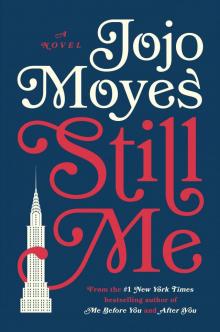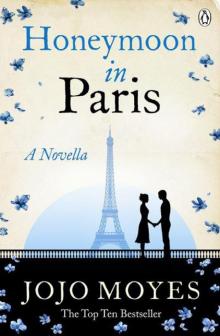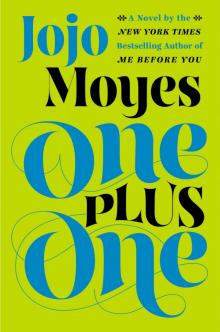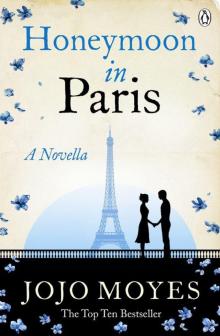- Home
- Jojo Moyes
After You Page 10
After You Read online
Page 10
“Louisa?”
“What?”
“Did he always plan to go to . . . that place? Dignitas?”
I nodded. I repeated the word to myself, trying to quell my rising sense of panic. In. Out. Just breathe.
“Did you try to change his mind?”
“Will was . . . stubborn.”
“Did you argue about it?”
I swallowed. “Right up until the last day.”
The last day. Why had I said that? I closed my eyes.
When I finally opened them again, she was watching me.
“Were you with him when he died?”
Our eyes locked. The young are terrifying, I thought. They are without boundaries. They fear nothing. I could see the next question forming on her lips, the faint searching in her gaze. But perhaps she was not as brave as I’d thought.
Finally she dropped her gaze. “So when are you going to tell his parents about me?”
My head lurched. “This week. I’ll call this week.”
She nodded, turned her face away so that I couldn’t see her expression. I watched as she inhaled again. And then, abruptly, she dropped the joint through the bars of the fire-escape steps, stood up, and climbed inside without a backward look. I waited until my legs felt as if they could support me again, then followed her through the window.
9
I called on Tuesday lunchtime, when a joint one-day strike by French and German air traffic control had left the bar almost empty. I waited until Richard had disappeared to the wholesalers, then stood out on the concourse, outside the last Ladies before security, and searched my phone for the number I had never been able to delete.
The phone rang three, four times, and just for a moment I was filled with the overwhelming urge to press END CALL. But then a man’s voice answered, his vowels clipped, familiar. “Hello?”
“Mr. Traynor? It—it’s Lou.”
“Lou?”
“Louisa Clark.”
A short silence. I could hear his memories thudding down onto him along with the simple fact of my name and felt oddly guilty. The last time I had seen him had been at Will’s graveside, a prematurely aged man, repeatedly straightening his shoulders as he struggled under the weight of his grief.
“Louisa. Well . . . goodness. This is— How are you?”
I shifted to allow Violet to sway past with her trolley. She gave me a knowing smile, adjusting her purple turban with her free hand. I noticed she had little Union Jacks painted on her fingernails.
“I’m very well, thank you. And how are you?”
“Oh—you know. Actually I’m very well too. Circumstances have changed a little since we last saw each other, but it’s all . . . you know . . .”
That temporary and uncharacteristic loss of bonhomie almost caused me to falter. I took a deep breath. “Mr. Traynor, I’m ringing because I really need to talk to you about something.”
“I thought Michael Lawler had sorted out all the financial matters.” The tenor of his voice altered just slightly.
“It’s not to do with money.” I closed my eyes. “Mr. Traynor, I had a visitor a short time ago and it’s someone I think you need to meet.”
A woman bumped into my legs with her wheeled case and mouthed an apology. I lifted my foot and turned away.
“Okay. There’s no simple way of doing this, so I’m just going to say it. Will had a daughter, and she turned up on my doorstep, and she’s desperate to meet you.”
A long silence this time.
“Mr. Traynor?”
“I’m sorry. Can you repeat what you just said?”
“Will had a daughter. He didn’t know about her. The mother is an old girlfriend of his, from university, who took it upon herself not to tell him. He had a daughter and she tracked me down and she really wants to meet you. She’s sixteen. Her name is Lily.”
“Lily?”
“Yes. I’ve spoken to her mother and she seems genuine. A woman called Miller. Tanya Miller.”
“I—I don’t remember her. But Will did have an awful lot of girlfriends.”
Another long silence. When he spoke again his voice cracked slightly. “Will had . . . a daughter?”
“Yes. Your granddaughter.”
“You—you really think she is his daughter?”
“I’ve met her mother, and heard what she had to say, and yes, I really think she is.”
“Oh. Oh, my.”
I could hear a voice in the background. “Steven? Steven? Are you all right?”
Another silence.
“Mr. Traynor?”
“I’m so sorry. It’s just—I’m a little . . .”
I put my hand to my head. “It’s a huge shock. I know. I’m sorry. I couldn’t think of the best way to tell you. I didn’t want to just turn up at your house in case . . .”
“No. No, don’t be sorry. It’s good news. Extraordinary news. A granddaughter.”
“What’s going on? Why are you sitting down like that?” The voice in the background sounded concerned.
I heard a hand go over the receiver, then, “I’m fine, darling. Really. I—I’ll explain everything in a minute.”
More muffled conversation. And then back to me, his voice suddenly uncertain. “Louisa?”
“Yes?”
“You’re absolutely sure? I mean, this is just so—”
“As sure as I can be, Mr. Traynor. I’m happy to explain more to you, but she’s sixteen and she’s full of life and she’s . . . well, she’s just very keen to find out about the family she never knew she had.”
“Oh, my goodness. Oh, my . . . Louisa?”
“I’m still here.”
When he spoke again I found my eyes had filled unexpectedly with tears.
“How do I meet her? How do we go about meeting . . . Lily?”
• • •
We drove up the following Saturday. Lily was afraid to go alone, but wouldn’t say as much. She just told me it was better if I explained everything to Mr. Traynor because “Old people were better at talking to each other.”
We drove in silence. I felt almost sick with nerves at having to enter the Traynor house again, not that I could explain it to the passenger beside me. Lily said nothing.
Did he believe you?
Yes, I’d said. I think he did. Although she might be wise to have a blood test, just to reassure everyone.
Did he actually ask to meet me, or did you suggest it?
I couldn’t remember. My brain had set up a kind of static buzz just speaking to him again.
What if I’m not what he’s expecting?
I wasn’t sure he was expecting anything. He’d only just discovered he had a grandchild.
Lily had turned up on Friday night, even though I hadn’t expected her until Saturday morning, saying that she’d had a massive row with her mother and that Fuckface Francis had told her she had some growing up to do. She sniffed. “This from a man who thinks it’s normal to have a whole room devoted to a train set.”
I had told her she was welcome to stay as long as (a) I could get confirmation from her mother that she always knew where she was; (b) she didn’t drink; and (c) she didn’t smoke in my flat. Which meant that while I was in the bath she simply walked across the road to Samir’s shop and chatted to him for the length of time it took to smoke two cigarettes, but it seemed churlish to argue. Tanya Houghton-Miller wailed on for almost twenty minutes about the impossibility of everything, told me four times I would end up sending Lily home within forty-eight hours, and only got off the phone when a child started screaming in the background. I listened to Lily clattering around in my little kitchen, and to music I didn’t understand vibrating the few bits of furniture in my living room.
Okay, Will, I told him silently. If this was your idea of pushing me into a whole new life you certainly nailed it this time.
• • •
That morning, I walked into the spare room to wake Lily and found her already awake, her arms curled around her
legs, smoking by my open window. An array of clothes was tossed around on the bed, as if she had tried on a dozen outfits and found them all wanting.
She glared at me as if daring me to say anything. I had a sudden image of Will, turning from the window in his wheelchair, his gaze furious and pained, and just for a moment it took my breath away.
“We leave in half an hour,” I said.
• • •
We reached the outskirts of town shortly before eleven. Summer had brought the tourists flocking back to the narrow streets of Stortfold like clumps of earthbound, gaudily colored swallows, clutching guide books and ice creams, weaving their way aimlessly past the cafés and seasonal shops full of castle-imprinted coasters and calendars that would be swiftly placed in drawers at home and rarely looked at again. I drove slowly past the castle in the long queue of National Trust traffic, wondering at the PAC-a-MACs, anoraks, and sunhats that seemed to stay the same every year. This year was the five-hundredth anniversary of the castle, and everywhere we looked there were posters advertising events linked to it: morris dancers, hog roasts, village fetes.
I drove up to the front of the house, grateful, suddenly, that we weren’t facing the annex where I had spent so much time with Will. We sat in the car for a moment and listened to the engine ticking down. Lily, I noticed, had bitten away nearly all of her nails.
“You okay?”
She shrugged.
“Shall we go in, then?”
She stared at her feet. “What if he doesn’t like me?”
“Why wouldn’t he?”
“Nobody else does.”
I closed the door. “I’m sure that’s not true.”
“Nobody at school likes me. My parents can’t wait to get rid of me.” She bit savagely at the corner of a remaining thumbnail. “What kind of mother lets her daughter go and live at the moldy old flat of someone they don’t even know?”
I took a deep breath. “Mr. Traynor’s a nice man. And I wouldn’t have brought you here if I thought it wouldn’t go well.”
“If he doesn’t like me, can we just leave? Like, really quickly?”
“Of course.”
“I’ll know. Just from how he looks at me.”
“We’ll skid out on two wheels if necessary.”
She smiled then, a small, reluctant grin.
“Okay,” I said, trying not to show her that I was almost as nervous as she was. “Let’s do it.”
• • •
I stood on the step, watching Lily so that I wouldn’t think too hard about where I was. The door opened slowly, and there he stood, still in the same cornflower blue shirt I remembered from two summers ago, but a newer, shorter haircut, perhaps a vain attempt to combat the aging effects of extreme grief. He opened his mouth as if he wanted to say something to me but had forgotten what it was, and then he looked at Lily and stared, and his eyes widened just a little. “Lily?”
She nodded.
He gazed at her intently. Nobody moved. And then his mouth compressed, and tears filled his eyes, and he stepped forward and swept her into his arms. “Oh, my dear. Oh, my goodness. Oh, it’s so very good to meet you. Oh, my goodness.”
His gray head came down to rest against hers. I wondered, briefly, if she would pull back; Lily was not someone who encouraged physical contact. But as I watched, her hands crept out and she reached around his waist and clutched his shirt, her knuckles whitening and her eyes closing as she let herself be held by him. They stood like that for what seemed an eternity, the old man and his granddaughter, not moving from the front step.
He leaned back, and there were tears running down his face. “Let me look at you. Let me look.”
She glanced over at me, embarrassed and pleased at the same time.
“Yes. Yes, I can see it. Look at you! Look at you!” His face swung toward mine. “She looks like him, doesn’t she?”
I nodded.
She was staring at him too, searching, perhaps, for traces of her father. When she looked down, they were still holding each other’s hands.
Until that moment, I hadn’t realized I was crying. It was the naked relief on Mr. Traynor’s battered old face, the joy of something he had thought lost and partially recaptured, the sheer unexpected happiness of both of them in finding each other. And as she smiled back at him—a slow, sweet smile of recognition—my nervousness, and any doubts I’d had about Lily Houghton-Miller were banished.
• • •
It had been less than two years, but Granta House had changed significantly since I had last been there. Gone were the enormous antique cabinets, the trinket boxes on highly polished mahogany tables, the heavy drapes. It took the waddling figure of Della Layton to indicate why that might be. There were still a few glowing pieces of antique furniture, yes, but everything else was white or brightly colored—new sunshine-yellow Sanderson curtains and pale rugs on the old wood floors, modern prints in unmolded frames. She moved toward us slowly and her smile was faintly guarded, like something she had forced herself to wear. I found myself moving back involuntarily as she approached; there was something oddly shocking about such a very pregnant woman—the sheer bulk of her, the almost obscene curve of her stomach.
“Hello. You must be Louisa. How lovely to meet you.”
Her lustrous red hair was pinned up in a clip, a pale blue linen shirt rolled up around slightly swollen wrists. I couldn’t help noticing the enormous diamond engagement ring cutting into her wedding finger, and wondered with a vague pang what the last months had been like for Mrs. Traynor.
“Congratulations,” I said, nodding toward her belly. I wanted to say something else, but I could never work out whether it was appropriate to say a heavily pregnant woman was “large,” “not large,” “neat,” “blooming,” or any of the other euphemisms people seemed to use to disguise what they wanted to say, which was essentially along the lines of bloody hell.
“Thank you. It was a bit of a surprise, but a very welcome one.” Her gaze slid away from me. She was watching Mr. Traynor and Lily. He still had one of her hands encased in hers, patting it for emphasis, and was telling her about the house, how it had been passed through the family for so many generations.
“Would everyone like tea?” she asked. And then, again, “Steven? Tea?”
“Lovely, darling. Thank you. Lily, do you drink tea?”
“Could I have juice, please? Or some water?” Lily smiled.
“I’ll help you,” I said to Della. Mr. Traynor had begun to point out ancestors in the portraits on the wall, his hand at Lily’s elbow, remarking on the similarity of her nose to this one, or the color of her hair to that one over there. Della watched them for a moment, and I thought I noticed something close to dismay flicker across her features. She caught me looking, and smiled briskly, as if embarrassed to have her feelings so nakedly on display.
“That would be lovely. Thank you.”
• • •
We moved around each other in the kitchen, fetching milk, sugar, a teapot, exchanging polite queries about biscuits. I stooped to get the cups out of the cupboard when Della couldn’t comfortably reach that low, and placed them on the kitchen worktop. New cups, I noticed. A modern, geometrical design, instead of the worn, delicately painted porcelain featuring wild herbs and flowers with Latin names that her predecessor had favored. All traces of Mrs. Traynor’s thirty-eight-year tenure here seemed to have been swiftly and ruthlessly erased.
“The house looks . . . nice. Different,” I said.
“Yes. Well, Steven lost a lot of his furniture in the divorce. So we had to change the look a bit.” She reached for the tea caddy. “He lost things that had been in his family for generations. Of course she took everything she could.”
She flashed me a look, as if assessing whether she could consider me an ally.
“I haven’t spoken to Mrs. . . . Camilla since Will . . .” I said, feeling oddly disloyal.
“So. Steven said this girl just turned up on your doorstep.�
� Her smile was small and fixed.
“Yes. It was a . . . surprise. But I’ve met Lily’s mother, and she . . . well, she was obviously close to Will for some time.”
Della stood up and put her hand on the small of her back, then turned back to the kettle. Mum had said she headed a small solicitors’ practice in the next town. You’ve got to wonder about a woman who hasn’t been married by thirty, she had said sniffily, and then, after a quick look in my direction, Forty. I meant forty.
“What do you think she wants?”
“I’m sorry?”
“What do you think she wants? The girl?”
I could hear Lily in the hall, asking questions, childish and interested, and I felt oddly protective. “I don’t think she wants anything. She just discovered she had a father she hadn’t known about, and wants to get to know his family. Her family.”
Della warmed and emptied the teapot, measured out the tea leaves (loose, I noted, just as Mrs. Traynor would have had). She poured the boiling water slowly, careful not to splash herself.
“I have loved Steven for a very long time. He—he—has had a very hard time this last year or so. It would be . . .” She didn’t look at me as she spoke. “It would be very difficult for him if Lily were to complicate his life at this point.”
“I don’t think Lily wants to complicate either of your lives,” I said carefully. “But I do think she has a right to know her own grandfather.”
“Of course,” she said smoothly, that automatic smile back in place. I realized, in that instant, that I had failed some internal test, and also that I didn’t care. And then with a final murmured check of the tray, Della picked it up and, accepting my offer to bring the cake and the teapot, carried it through to the drawing room.
• • •
“And how are you, Louisa?”
Mr. Traynor leaned back in his easy chair, a broad smile breaking his saggy features. He had talked to Lily almost constantly throughout tea, asking questions about her mother, where she lived, what she was studying (she didn’t tell him about the problems at school), whether she preferred fruitcake or chocolate (“Chocolate? Me too!”), liked ginger (no), and cricket (not really—“Well, we’ll have to do something about that!”). He seemed reassured by her, by her likeness to his son. At that point, he probably wouldn’t have cared if she had announced that her mother was a Brazilian lap dancer.
I watched him sneaking looks at Lily when she was talking, studying her in profile, as if perhaps he could see Will there too. Other times I caught a flicker of melancholy in his expression. I suspected that he was thinking what I had thought: this new, unexpected grief that his son would never know her. Then he would almost visibly pull himself together, forcing himself a little more upright, a ready smile back upon his face.
He had walked her around the grounds for half an hour, exclaiming when they returned that Lily had found her way out of the maze “on your first go! It must be a genetic thing.” Lily had smiled as broadly as if she had won a prize.
“And Louisa? What is happening in your life?”
“I’m fine, thank you.”
“Are you still working as a . . . caregiver?”

 Me Before You
Me Before You After You
After You The Last Letter From Your Lover
The Last Letter From Your Lover Still Me
Still Me Honeymoon in Paris
Honeymoon in Paris Night Music
Night Music The Girl You Left Behind
The Girl You Left Behind Windfallen
Windfallen One Plus One
One Plus One Paris for One and Other Stories
Paris for One and Other Stories The Giver of Stars
The Giver of Stars The Ship of Brides
The Ship of Brides The Peacock Emporium
The Peacock Emporium Silver Bay
Silver Bay The Horse Dancer
The Horse Dancer Peacock Emporium
Peacock Emporium Honeymoon in Paris: A Novella
Honeymoon in Paris: A Novella Ship of Brides
Ship of Brides Paris For One (Quick Reads)
Paris For One (Quick Reads)